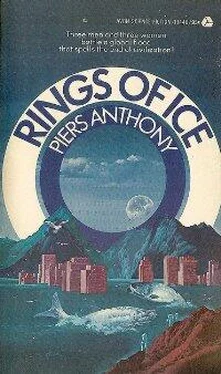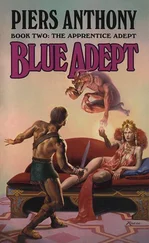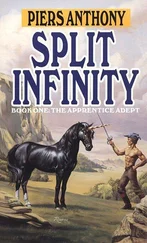“Out scouting with Thatch. This moss is growing over everything, making the terrain unfamiliar, so he has to be updated every so often.” She shook her head. “I rather envy Gloria. When she gets tired or fed up, presto—a man!”
“Moss?”
“You’re too absorbed in your garden, Zena! Haven’t you noticed it?”
“I suppose I have. I just didn’t realize its extent. I keep it out of the garden automatically.”
They watched Dust Devil pounce on a huge brown beetle that had been bulldozing its way toward the garden. The thing buzzed and fought in a manner that made Zena shudder. If bugs now stood up to cats, what would be next?
“I think this cloud-cover encourages it,” Karen said. “We don’t get much direct sunlight any more.”
“Yes. I hope we don’t have trouble with vitamin D deficiency.”
“Plenty of that in those vitamin pills we loaded up on. They’ll last a year, at least—and the rain can’t go on longer than that, can it?”
“Unlikely. Too bad we couldn’t find you similar reserves of—” Zena paused, having second thoughts as she spoke, but it was too late. So she modified the subject and went on: “Would you mind explaining just what your insulin does? I know it keeps you going, but—”
“I could lecture for hours! But in essence, it’s this way: I have what is called ‘juvenile diabetes mellitus’. That’s the most serious kind; for some reason children get it much worse than adults. It means a portion of my pancreas called the ‘islets of Langerhans’ that normally makes insulin has failed. Insulin is needed to get the glucose, the blood sugar, out of my blood and into my muscles. Without it, my body starves, no matter how much sugar piles up in my blood. It’s like a trainload of food with nobody to unload it for the starving people. The pileup gets worse and worse—”
“That’s why diabetics have sweet urine!” Zena exclaimed, understanding.
“That’s why. So much sugar there that we’re pissing it out—and dying for lack of it in our body cells. Real irony. So we take insulin, to make up for what our body lacks, and that does the job. But if we take too much, it uses up too much of the blood sugar, making a critical shortage, and—”
“Shock! I see it now. But you take more insulin when you’re working hard—”
“Less, honey. Work helps the insulin, so I need less. If I don’t cut down, I’m in trouble, unless I take more sugar.”
“So you’re really saving insulin when you do this water carrying.”
“That’s right. And since my supply is limited, that’s all to the good.”
Zena felt a sudden chill. She had gotten to like Karen as she understood her better; the woman was a hard worker with a steady temper. “ How limited?”
“Don’t worry! I use Lente U80—that’s a fairly long-lasting combination, and strong. It doesn’t need to be refrigerated. You’ve seen my hexagonal vials? Insulin is shape-coded. I have a good six months supply, and with careful management I can stretch it out—”
“Six months!” Zena cried, appalled. “What then?”
Karen looked at the sky. “Well, it doesn’t keep forever, anyway. That’s a pretty heaven.”
“Karen—”
“But I don’t understand that shape to the north. That set of cow horns. Is that the devil coming for us?”
How could Karen be so strong? It was death she contemplated in six months, or however long her insulin lasted. Certainly not more than a year. Yet she carried on without complaint.
Karen turned, concerned at Zena’s silence. “Why Zena, you’re crying,” she said gently. “I’m sorry.”
“I never cry!” Zena protested, wiping her face with the back of one dirty hand.
“Oh, you should cry! I cried a lot when this started— the needle, the sugar-watching. It’s no shame.”
“It is to me!”
“It shows you’re human. No shame at all—so long as you get up afterwards and do what must be done. So that there is a continuity. I’m sure you will. Meanwhile I take it as a signal compliment—if your first tears are for me.”
“Oh, Karen, this is awful! Can’t we find some more insulin?”
“Only if some company still makes it. That’s possible. Gus has been listening in on the radio, just in case.”
Zena had thought Gus was merely entertaining himself instead of working. Now she was embarrassed. She had been misjudging people again.
“It is just possible that there is some in Atlanta …”
Atlanta. Where they dared not inquire.
“I really am curious about those horns,” Karen reminded her. “I’m not unduly superstitious, but I feel watched.”
Zena looked north. “It’s the polar opening. The cloud canopy can’t cover the globe entirely—there’s nothing for it to rotate about at the poles. So it falls there, or fails to form, and leaves a circular opening. Nothing supernatural.”
“But we can’t see the north from here, and it’s not a circle.”
“The cloud layer is becoming reflective. The image bounces off the bottom surface and reaches us inverted. We only see part of it, and naturally it’s distorted.”
“You mean we’re seeing around the horizon?”
“Two and a half thousand miles around,” Zena said. “Maybe more. The effect will get stronger as the canopy thickens.”
“Not the devil…”
“Not the devil!” They exchanged smiles.
The garden languished, but the sky grew in splendor. Halos of light appeared around the dimming sun—huge circular rainbows, with all their colors. At first they were hazy, extremely faint, but now they could be seen by anyone. Sometimes there was a double ring, and sometimes only a semicircle.
Still that serpent of Mindel writhed across the welkin, growing darker and stronger in its changing manifestations. Some days it hardly showed in the high haze; other days it seemed ready to swallow the sun itself.
Zena had a sobering thought: What if Mindel did not collapse before Riss arrived? Then the third ring of ice would overshadow the second canopy, and break down on top of it, forming either a double canopy or a doubly thick one. Which would make the eventual rain that much more severe.
And if that rain took longer than two months, as it probably would, considering how much water had to be cleared this time, the fourth ring, Wurm, would form on top of that. There would be not two, but three canopies breaking down together.
It would be one hell of a deluge.
Gus was trying the radio again, while Gloria washed the dishes. “Gus, I want to apologize,” Zena said.
He glanced up. “Forget it.”
“I haven’t even told you what for!”
“It’s about the radio, isn’t it? I knew you’d understand when you thought it out.”
“Have you found anything?”
“Lots of stuff. Nothing we can use. It would help if I could talk to them, ask questions.”
“I understand there are five stages of dying,” Gloria said.
“Nobody’s going to die!” Gus snapped.
Gloria was unshaken. “The first is denial. The second is anger.”
“How about action?” Gus growled.
“I’m thinking of inevitable death, that the patient knows is coming. Like leukemia, or—”
“Diabetes,” Zena put in—and again was sorry. She spoke too often, now, before she thought.
“God won’t let it happen,” Gus said.
“God let the rings of ice happen!” Zena said.
“That’s the third stage,” Gloria said. “Bargaining with God. I’d respect prayer more if it came at occasions other than the last resort. The fourth stage is depression—and the last is acceptance.”
“Karen has reached it,” Zena said. “ I haven’t.”
Читать дальше










